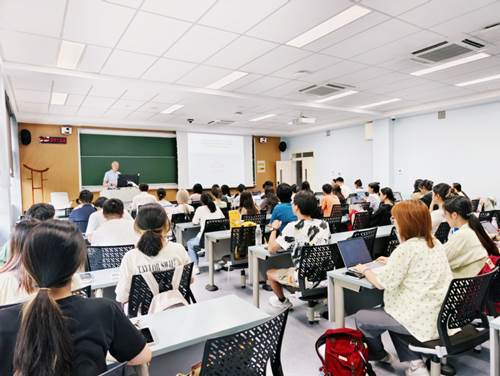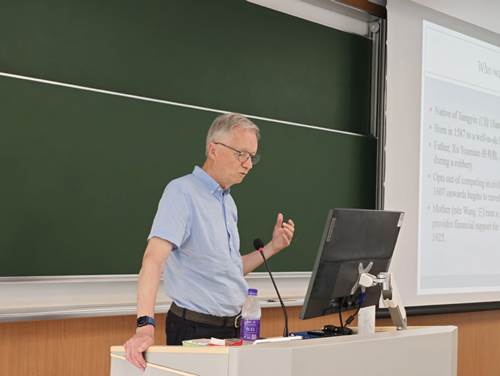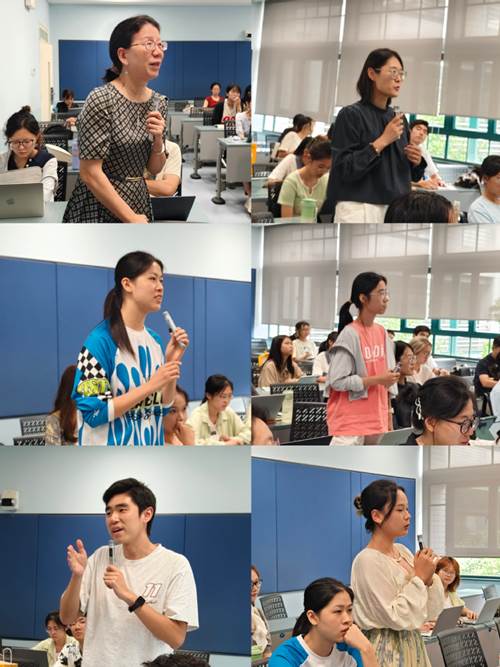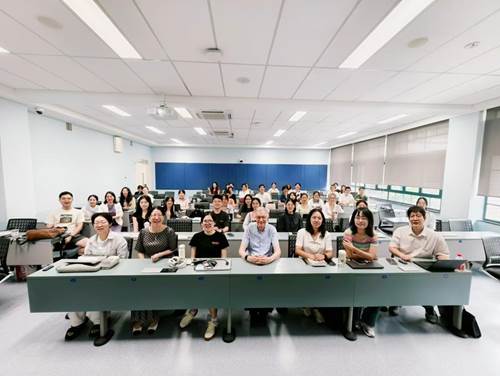On the morning of September 10, Professor Allan H. Barr, a distinguished sinologist and translator from Department of Asian Languages and Literatures at Pomona College, USA, delivered a lecture titled “Karst Caves and Hinterland Hazards: Translating Xu Xiake’s Diaries”. The lecture, moderated by Teacher LU Qiaodan, drew a large and engaged audience.

During the lecture, Professor Allan discussed the challenges of translating the archaic language of Xu Xiake’s Travel Notes, particularly the landscapes described within. He used the word ‘巖(岩)’ as an example, which can signify both ‘cliff’ and ‘mountain cave’ according to A Student’s Dictionary of Classical and Medieval Chinese. To tackle such challenges, he employed two strategies. First, the translator should examine the meaning of ancient Chinese in context. Professor cited the example of “There was a road behind the nunnery to go up, so I went up to it and discovered a cave” in A Journey to the Wuyi Mountain. In this context, cave is a good translation. Second, the translator should adopt a hands-on approach by visiting the actual landscapes described. Professor Allan shared his two-week immersive field trip to Sanli Town, Shanglin County, Guangxi Zhuang Autonomous Region. During this trip, he explored the Karst formations Xu Xiake wrote about, including the Goulou Moutain in Beiliu and Qingshi South Cave in Shanglin. These experiences contributed to his translation significantly.

Professor Allan then outlined the contents of Xu Xiake’s Travel Notes, noting that the travels to famous mountains account for about 8% of the text, while explorations in the southwest region make up approximately 92%. These accounts cover a range of topics, including natural and cultural landscapes, local customs, and other regional aspects. He discussed the dilemma of selecting which parts of the source text to translate, given the constraints of space. Professor Allan referenced two existing English translations, Li Qi’s The Travel Diaries of Hsu Hsia-k’o and Travel Accounts of Xu Xiake: Chinese-English Bilingual Edition by Li Weirong, Lu Changhuai, and Jia Xiuhai. He pointed out that existing translations focus on the travels to famous mountains, often overlooking the southwest region; meanwhile, these translations are relatively old versions, so they are not so popular in America. Drawing on his insights into American readers’ interests, Professor Allan emphasized the difficulty of translating scenic descriptions and the need to make the contents more engaging for modern readers. Therefore, he chose to focus on the challenges Xu Xiake faced during his travels and his interactions with those around him, believing these aspects provide a more captivating narrative. He is also dedicated to translating the southwest areas depicted in the book to fill the gaps left by previous translations.
Professor Allan shared his joy in translation, discussing the diverse sources Xu Xiake drew from, such as official annals compiled by the imperial court, records of local customs, oral traditions from Buddhists, Taoists, and common folks, and traditional Chinese divination. He also shared the obstacles Xu Xiake faced and the anecdotes of the author’s encounters with various individuals through excerpts from his translation, showcasing the allure of Xu Xiake’s travels and the charm of translating classics.

The lecture concluded with a dynamic Q&A session with students and teachers, covering topics like translation strategies, base text selection, and reader experience. Professor Allan clarified that he tries to seek a balance between ‘domestication’ and ‘foreignization’ instead of rigidly adhering to one translation strategy. He consistently aims to create translations that not only resonate with readers but also bring them joy, apart from ensuring smooth and fluent target language. Despite the challenges of translating previously untranslated sections with limited reference material, Professor Allan expressed his enjoyment of the process.
Professor Allan’s dedication, meticulousness, and passion for promoting China’s cultural heritage left a lasting impression on the participants. After a group photo, he expressed his hope that everyone would find and appreciate joy in the art of translation.

Text/Photos: JIANG Yuhua/LU Qiaodan
Review: DU Lei, GAO Rui
The Chinese Academy of Translation and Translation Studies of Zhejiang University
Institute of Translation Studies, Zhejiang University
Elementary Teaching Organization of Translation Major, School of International Studies, Zhejiang University
Translated by XIAO Ran, Proofread by XU Xueying



